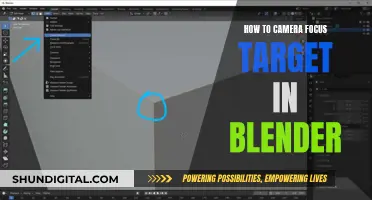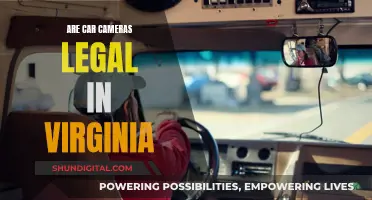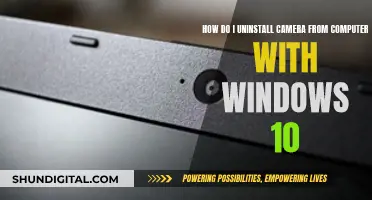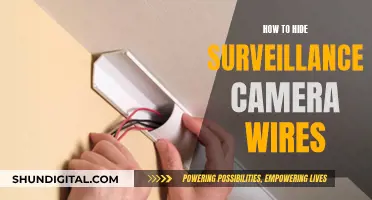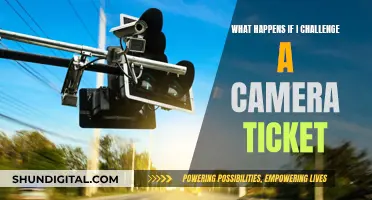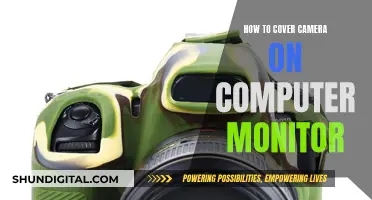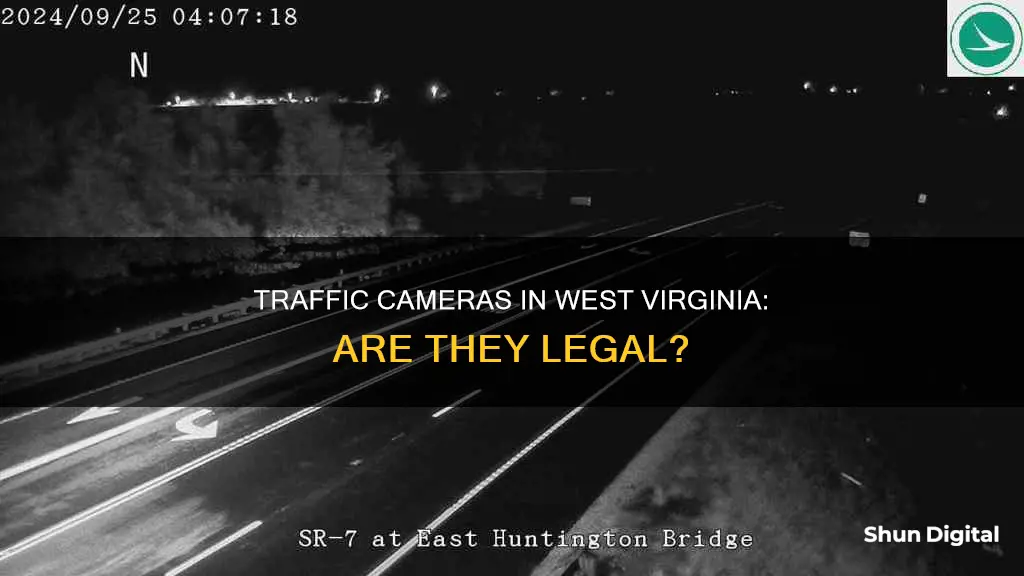
Traffic cameras are a common feature of modern life, but their use is not without controversy, particularly when it comes to enforcing traffic laws. In West Virginia, the use of traffic law photo-monitoring devices by law enforcement to enforce rules related to the operation of motor vehicles is prohibited. This includes the detection of violations such as red-light running and speeding, which are commonly enforced through the use of automated cameras in other states. The West Virginia Legislature has maintained this rule since 2007, and it applies to both municipal and county ordinances.
| Characteristics | Values |
|---|---|
| Are traffic cameras illegal in West Virginia? | Yes |
| What about other states? | Varies by state |
| Are there any exceptions? | Yes, cameras can be used for non-motor-vehicle-related crimes and for public safety reasons |
| What about other types of speed detection? | Radar guns and other non-camera devices are allowed |
| Can footage be used as evidence in a car accident case? | Yes, victims can request footage from local authorities to use as evidence |
| What about privacy laws? | Video surveillance is generally legal in public places but not in places where privacy is expected, such as restrooms |
What You'll Learn
- Traffic law photo-monitoring devices are banned for traffic law enforcement in WV
- Footage from these devices cannot be used as evidence for traffic violations
- Cameras can be used for non-motor-vehicle-related crimes
- WV residents can obtain traffic camera footage of accidents
- Public safety cameras are allowed in some WV cities

Traffic law photo-monitoring devices are banned for traffic law enforcement in WV
In West Virginia, traffic law photo-monitoring devices are banned for traffic law enforcement. This means that law enforcement officers cannot use these devices to determine compliance with or detect violations of any provisions that govern or regulate the operation of motor vehicles. The ban includes both municipal and county ordinances.
The West Virginia Code defines a "traffic law photo-monitoring device" as:
> an electronic system consisting of a photographic, video, or electronic camera and a means of sensing the presence of a motor vehicle that automatically produces photographs, videotape, or digital images of the vehicle, its operator, or its license plate.
This ban has been in place since 2007 and prohibits the use of photo or video evidence obtained by these devices to prove violations of traffic laws. However, footage from these devices can be used as evidence for non-motor-vehicle-related crimes.
It is important to note that this ban only applies to the use of traffic law photo-monitoring devices for traffic violations. Cities in West Virginia, such as Bridgeport and Elkins, have installed street cameras for reasons related to public safety, including accident reports. Additionally, the ban does not include other types of speed-monitoring devices, such as speed and radar guns.
While West Virginia has banned the use of traffic law photo-monitoring devices for traffic enforcement, other states in the region, including Pennsylvania, Maryland, Virginia, and Ohio, allow their use in certain instances, such as in work or school zones.
Charging Cameras on 'Alone': Powering the Ultimate Survival Show
You may want to see also

Footage from these devices cannot be used as evidence for traffic violations
In West Virginia, any footage from a "traffic law photo-monitoring device" cannot be used as evidence to prove that someone violated a law regarding the operation of motor vehicles. This rule has been in place since 2007, according to the West Virginia Legislature website.
The West Virginia Code states that:
> "No police officer may utilize a traffic law photo-monitoring device to determine compliance with, or to detect a violation of, a municipal or county ordinance or any provision of this code that governs or regulates the operation of motor vehicles." (WV Code §17C-6-7a (b))
This means that law enforcement cannot use automated traffic cameras to enforce any rules related to the operation of motor vehicles, such as speed limits or red-light violations. The code defines a "traffic law photo-monitoring device" as:
> "an electronic system consisting of a photographic, video, or electronic camera and a means of sensing the presence of a motor vehicle that automatically produces photographs, videotape, or digital images of the vehicle, its operator, or its license plate."
While footage from these devices cannot be used as evidence for traffic violations, there are some exceptions and workarounds. For example, the rule against red lights and speed cameras only applies to traffic violations. Cities in West Virginia, such as Bridgeport and Elkins, have installed street cameras for reasons related to public safety, such as for accident reports. While these cameras cannot be used to directly enforce speed limits or catch red-light violators, the footage they capture can be used as evidence for non-motor-vehicle-related crimes.
Additionally, the law does not limit the use of non-camera devices that monitor and display a vehicle's speed, such as speed and radar guns. These devices can still be used by law enforcement to enforce speed limits and other traffic regulations.
Troubleshooting Blurry Surveillance Cameras: Finding Focus
You may want to see also

Cameras can be used for non-motor-vehicle-related crimes
In West Virginia, the use of a "traffic law photo-monitoring device" by law enforcement to enforce rules related to the operation of motor vehicles is not allowed. This means that no police officer may use such a device to determine compliance with or detect a violation of a municipal or county ordinance or any provision of the state code that governs or regulates the operation of motor vehicles.
However, this rule against red-light and speed cameras only applies to traffic violations. Several north-central West Virginia cities, including Bridgeport and Elkins, have added or plan to add street cameras for reasons related to public safety, such as for accident reports. Importantly, cameras can be used as evidence of non-motor-vehicle-related crimes.
The use of cameras for non-motor-vehicle-related crimes is a significant aspect of the discussion surrounding traffic cameras in West Virginia. While the state has strict regulations against the use of cameras for traffic enforcement, there is a degree of flexibility when it comes to utilising this technology for other purposes related to public safety and crime prevention.
The presence of street cameras in certain areas can serve as a deterrent for criminal activities beyond traffic violations. These cameras can capture footage that may be useful in investigating and solving crimes, such as assaults, robberies, or vandalism. Additionally, in situations where there is a need to monitor specific individuals or locations, strategically placed cameras can provide valuable surveillance footage to law enforcement agencies.
It is worth noting that while West Virginia prohibits the use of traffic law photo-monitoring devices for motor vehicle-related offences, it does not restrict the use of non-camera devices meant to monitor and display a vehicle's speed, such as speed and radar guns. This distinction highlights the state's focus on balancing public safety with privacy concerns.
In conclusion, while West Virginia has clear laws prohibiting the use of traffic cameras for motor vehicle-related violations, the state recognises the potential benefits of utilising this technology for non-motor-vehicle-related crimes. The use of cameras in this context can provide valuable evidence and support law enforcement efforts in maintaining public safety and reducing crime.
Charging Camera Batteries: First-Time User Guide
You may want to see also

WV residents can obtain traffic camera footage of accidents
In West Virginia, the use of a "traffic law photo-monitoring device" is not permitted by law enforcement to enforce any rules related to the operation of motor vehicles. This means that traffic cameras cannot be used to monitor speed limits or issue tickets for traffic violations. However, this does not mean that traffic cameras are completely illegal in the state.
Traffic cameras are still used in West Virginia to capture and record footage of traffic incidents, accidents, and other major events. These cameras are often located at intersections, on highways, and in other areas where they can monitor traffic flow and capture any incidents that may occur. While this footage cannot be used as evidence in motor vehicle violation cases, it can serve other purposes, such as accident investigation and reconstruction, law enforcement, and traffic research.
If you are a WV resident who has been involved in a car accident, obtaining traffic camera footage of the incident can be crucial for your case. Here are the steps you can take to acquire this footage:
- Identify the Camera Owner: Before leaving the accident scene, take note of any nearby traffic cameras. The cameras may be operated by the local government or a third-party contractor. This information will be useful when requesting footage.
- Contact the Authorities: Victims of car accidents have the right to apply for traffic camera footage at local police offices. You can submit a request to the relevant authority, and they will guide you through the process. It is recommended to seek the support of a legal professional, as the process can sometimes be complicated.
- Consider Alternative Sources: If the accident occurred near businesses, you can contact the owners to find out if they have surveillance cameras that may have captured the incident. In the case of highway accidents, traffic cameras installed on power poles may also provide relevant footage.
- Act Quickly: Keep in mind that retention periods for traffic camera footage vary. In West Virginia, footage is typically retained for 90 days per camera but can sometimes be extended by an additional 30 to 60 days. It is important to act promptly to ensure the footage you need is not deleted or overwritten.
- Engage a Legal Professional: Obtaining traffic camera footage can be complex, especially if it involves subpoenaing footage from a third-party company. A car accident attorney can handle this process for you, helping you secure the evidence you need to strengthen your case.
By following these steps, WV residents can increase their chances of obtaining traffic camera footage of accidents, which can be invaluable in establishing liability, seeking financial compensation, and supporting their legal claims.
Fight Camera Tickets: Ohio's Legal Options for Drivers
You may want to see also

Public safety cameras are allowed in some WV cities
In West Virginia, traffic law photo-monitoring devices cannot be used by law enforcement to enforce rules related to the operation of motor vehicles. This means that no police officer may use a traffic law photo-monitoring device to determine compliance with or detect a violation of a municipal or county ordinance or any provision of the West Virginia Code that governs or regulates the operation of motor vehicles. This rule has been in place since 2007.
However, this restriction only applies to traffic violations. Several north-central West Virginia cities, including Bridgeport and Elkins, have added or plan to add street cameras for reasons related to public safety, such as for accident reports. These cameras can be used as evidence of non-motor-vehicle-related crimes.
While the use of traffic cameras to enforce speed or red-light laws is prohibited in West Virginia, it's important to note that other states have different regulations. For example, Maryland and Virginia allow the use of traffic law monitoring cameras in certain instances, such as in work or school zones.
In terms of video surveillance in West Virginia, it is generally legal to conduct video surveillance in public places as long as it is not in an area where a person has a reasonable expectation of privacy, such as a restroom or dressing room.
Perfecting Computer Sex: Camera Angle Testing Tips
You may want to see also
Frequently asked questions
Yes, according to West Virginia Code, the use of a "traffic law photo-monitoring device" is not allowed by law enforcement to enforce any rules related to the operation of motor vehicles.
No, any footage from a traffic law photo-monitoring device cannot be used as evidence to prove that someone violated a law regarding the operation of motor vehicles.
Yes, the law does not apply to non-camera devices that are meant to monitor and/or display a vehicle's speed, such as speed and radar guns.
No, you cannot get a traffic ticket from a camera in West Virginia as the use of traffic law photo-monitoring devices is prohibited for enforcing traffic laws.
Yes, there was a law introduced in the West Virginia House of Representatives during the 2023 legislative session to allow camera-assisted enforcement of speeding in active work zones, but it was not passed.


